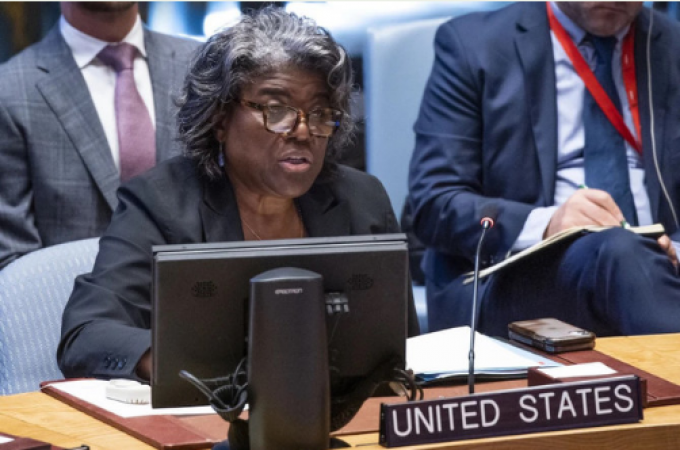
UNO: Despite opposition from Russia and China, the United States and its allies vowed on Tuesday to keep Syria's failure to account for its chemical weapons programme front and centre at the UN Security Council each month.
The government of Syrian President Bashar Assad, according to US Ambassador Linda Thomas-Greenfield, "has repeatedly lied to the international community" and to inspectors from the global watchdog on chemical weapons, who have confirmed that the government used these outlawed weapons on at least nine occasions.
She asserted that the Biden administration will keep up its demands for Syria to provide a full accounting, as it promised when it ratified the Chemical Weapons Convention in September 2013 under pressure from its close ally Russia in the wake of a deadly chemical weapons attack in the Ghouta suburb of Damascus that the West blamed on Damascus.
Also Read: Celebrate International Cat Day with your cute furry Friend with all Rudiments
Russia and China first declined to speak at the monthly meeting on the Syrian chemical weapons issue, citing their repetition and the need for speaking time reduction.
Alhakan Dandy, the minister counsellor for Syria, did speak, expressing his country's surprise at the meeting this month "given that there have been no developments that would require it," aside from what he called persistent attempts by the United States "to exploit the chemical weapons file to serve their agenda of hostility against Syria."
In addition to reiterating Syria's condemnation of the use of chemical weapons, he also referred to allegations that these weapons were used in Ghouta, where more than 1,400 people died, as "lies." Additionally, he insisted that chemical weapons are not in the Syrian military's arsenal.
Dandy claimed that Syria had collaborated with the organisation that oversees the Chemical Weapons Convention's implementation, the Organisation for the Prohibition of Chemical Weapons. However, he also charged that the investigation's investigators were politicised and "using unprofessional working methods and double standards."
Adedeji Ebo, the UN's deputy chief for disarmament, however, informed the council that Syria had once more failed to give the OPCW a complete accounting of its programme, citing "gaps, inconsistencies, and discrepancies" in its declaration.
He specifically mentioned unanswered queries regarding the activities of Syria's Scientific Studies and Research Centre "and the declaration of quantities of nerve agents produced at one chemical weapons production facility that was declared by the Syrian Arab Republic as never having been used to produce chemical weapons."
Ebo reaffirmed the UN's repeated request for Syria "to respond with urgency" to all OPCW inquiries.
Also Read: Berlin-Warsaw Spat: Poland's Deputy Foreign Minister Accuses Germany of Undermining Economy
On June 22 and 23, a delegation from the OPCW's technical secretariat did meet with Syrian representatives in Beirut, and according to Ebo, Syria agreed to present suggestions for improving the implementation of its obligations. He stated that the OPCW is awaiting word from Damascus regarding the continuation of negotiations.
Thomas-Greenfield expressed regret over the silence of two permanent council members—she did not name them. China and Russia were the only nations to keep quiet.
She asserted that "the Assad regime is betting that this council will merely move on." "It is hoping that we will change the subject."
"We must resist giving in to drowsiness or, worse, indifference. Weapons of mass destruction were used by the Assad regime against its own citizens. And we won't change, and the regime won't get away with anything, the US ambassador declared.
Also Read: 10 Soldiers Killed as Daesh Strikes Syrian Army Checkpoint
Although the United Arab Emirates, the council's Arab representative, argued that the issue of Syria's chemical weapons should be discussed every three months rather than every month, there was broad support from other council members that Syria must respond to all inquiries from the OPCW.